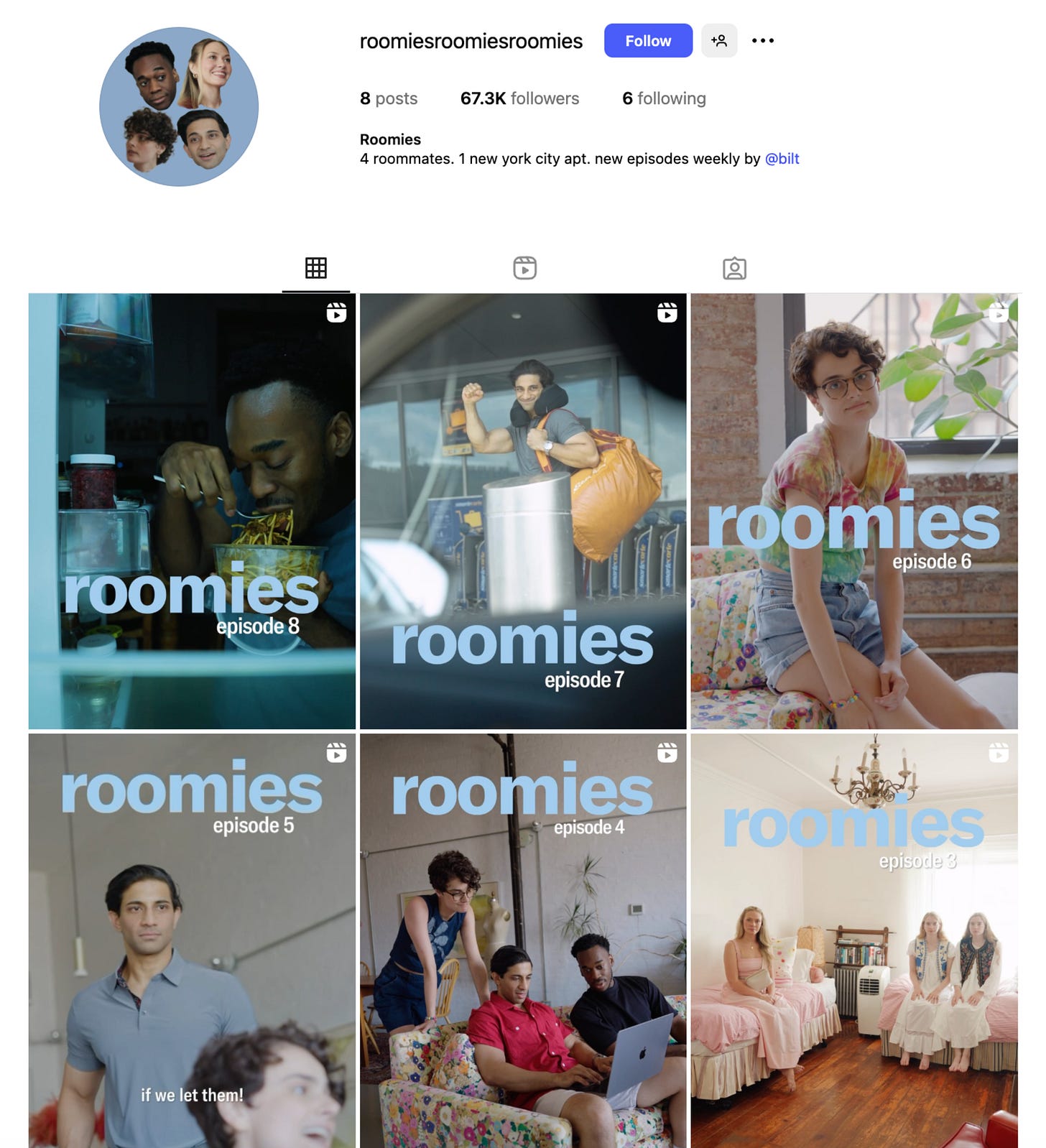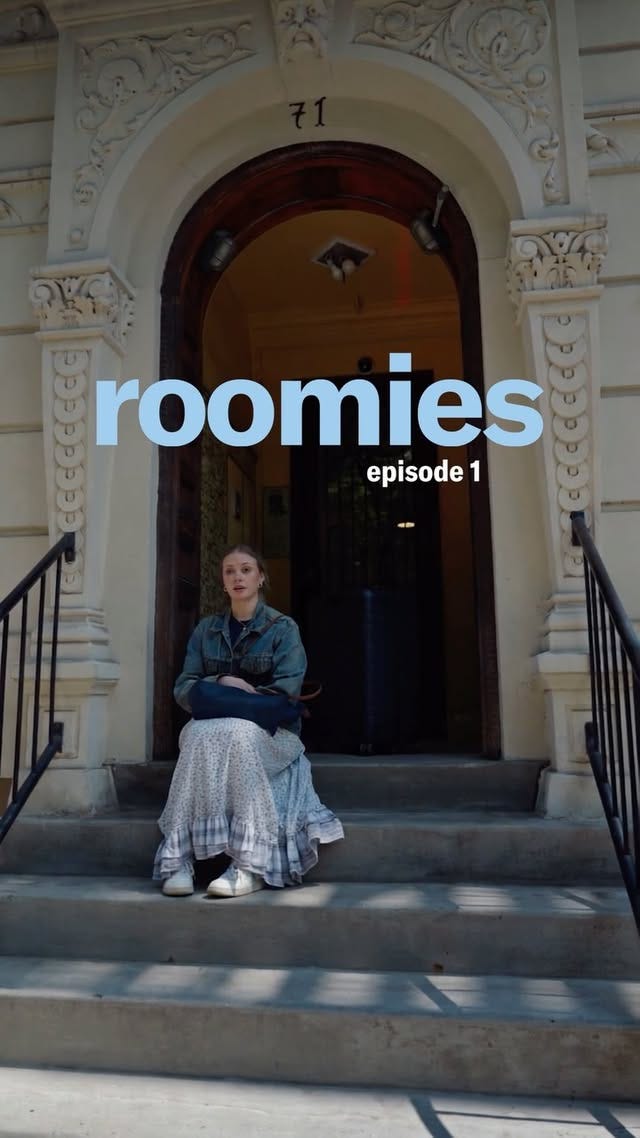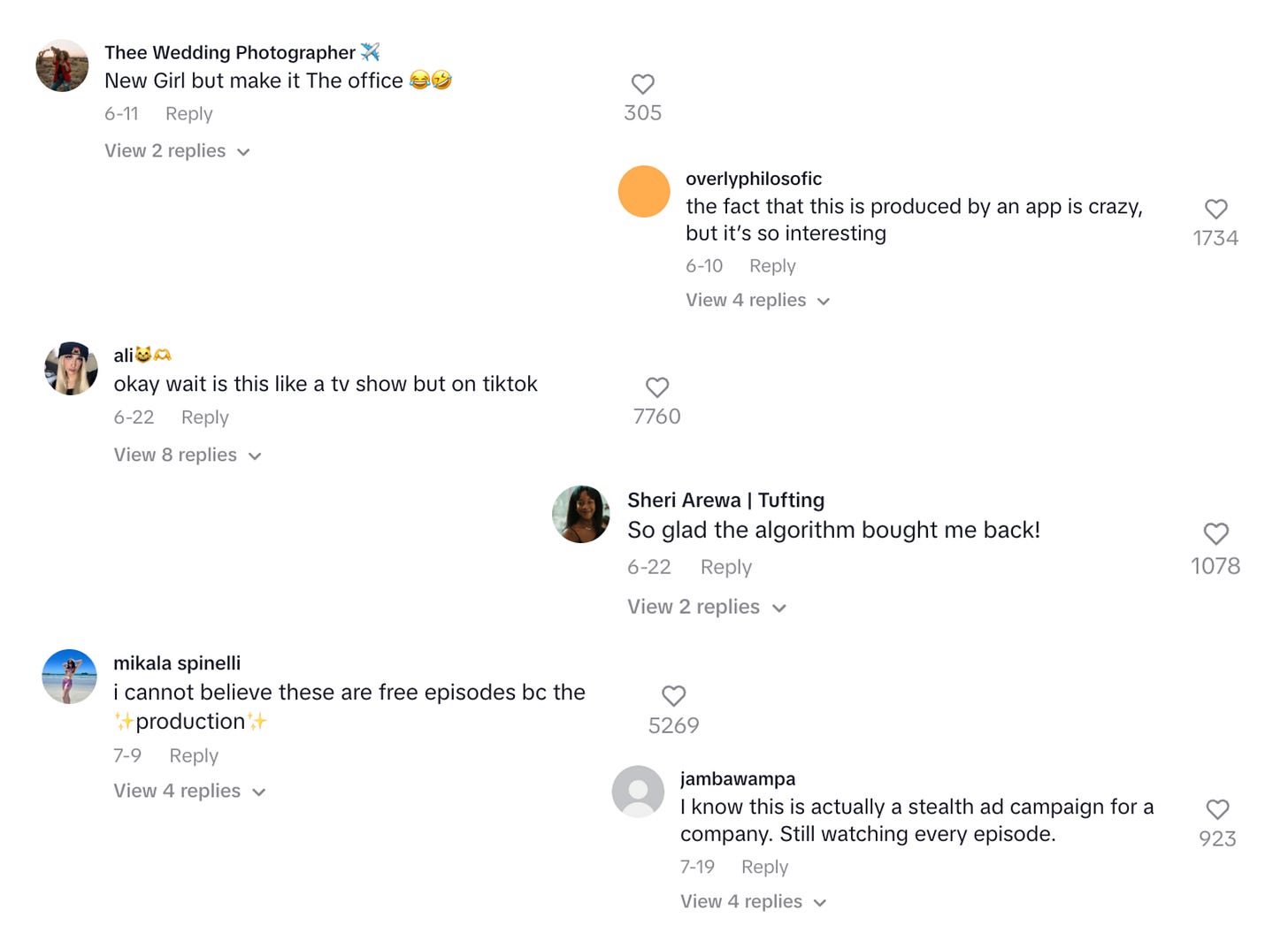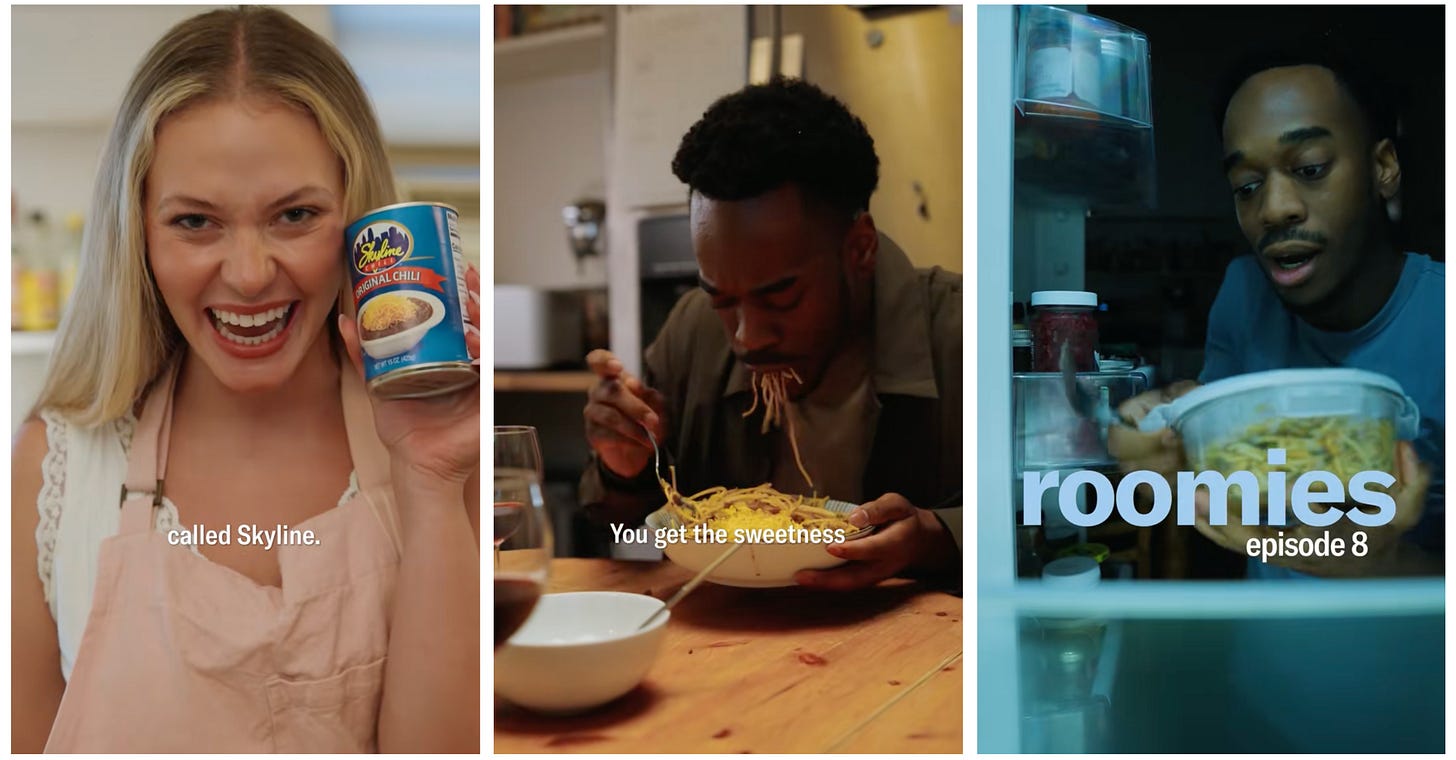Inside Bilt's popular "Roomies" series
You might not realize a brand is behind the account @RoomiesRoomiesRoomies. That's the point.
Are you sensing a theme to this week’s newsletters? We’re going deep on social shows. I haven’t stopped thinking about this quote from Little Joy in Tuesday’s newsletter:
“Social media is replacing television. And just like in television, there’s the shows you tune-in to watch and there’s the commercials you suffer through. Stop making commercials. Be the show.”
Today I am digging into points-on-rent company Bilt’s scripted mockumentary series Roomies. The plot revolves around a 25-year-old from Ohio moving to New York, finding roommates, and figuring out life. Instead of sharing episodes of the series on their official @Bilt accounts, they created an entirely new account called @RoomiesRoomiesRoomies.
So far eight episodes have been released across TikTok and Instagram, racking up over 8M views and 115K followers. You’ll find engaged commenters remarking “My show is onnn” and “love how my algorithm just brings me back every week”. Some realize the account is from a brand, others don’t. As I found out in today’s interview, that’s kind of the point.
Below is my conversation with Bilt’s Senior Director of Content Cyrus Ferguson and Chief Marketing Officer Zoe Oz. We talk about producing Roomies in-house, not letting branding get in the way of storytelling, and having the patience to play the long game.
Rachel Karten: How did the idea for Roomies come about?
Cyrus Ferguson: The idea really came from observing our audience and recognizing a gap in how brands were showing up in the content space. We saw how our members were all navigating these universal experiences: roommate drama, career pivots, figuring out adulting. And we thought, what if instead of interrupting their content scroll with ads, we actually created something they'd genuinely want to watch? Something that reflected their actual lived experience? The mockumentary format felt perfect because it's inherently authentic and relatable, but we could structure it with longer, chronological narrative arcs.
RK: Are you producing the series in-house?
CF: Yes, this is a fully Bilt-driven production. We’ve found this to be essential when it comes to creating something that both shows up with the production quality we want to represent our brand, while also being nimble enough to make it work for social.
RK: Talk me through the team that's writing, casting, and filming the show.
CF: We've assembled an internal team that really gets both traditional storytelling and native social content. On the writing side, we’re attempting TV-level character development and comedy that will work in a vertical, short-form environment. We brought on my partner (in life and creativity), Brooke Brazer, as a creative producer to help with character development, casting, and production.
In our casting, we looked for actors who could bring that documentary-style naturalism–people who feel like real roommates you might actually know, while also being funny characters you want to root for.
The production team has experience in both traditional film and social-first content, which is crucial because this isn't just TV chopped up for social; it's shot and edited for how people watch content today.
RK: Can you share more about the investment that went into the show? Was this a big initiative for your marketing team?
Zoe Oz: While I can't get into specific numbers, I will say this is an investment for us—particularly in terms of strategic focus. We approached Roomies the same way we'd approach any marketing initiative: with proper planning, dedicated resources, and a clear ROI framework.
What made it feel like a big bet wasn't just the financial investment, but the fact that we were pioneering something new in our space. There's inherent risk in being first to market with this kind of content approach, but that's also where the opportunity lies. We allocated resources not just for production, but for the entire ecosystem—from content creation to community management to performance tracking. It required buy-in from leadership because we're playing a longer game here than traditional advertising.
RK: Why does a show like this make sense for Bilt to produce? How does it ladder up to bigger company goals?
ZO: Roomies is actually a perfect expression of our broader business strategy. We're building a lifestyle ecosystem through our neighborhood commerce platform. Like Cyrus said, our members are navigating major life transitions: moving, renting, career changes, relationship shifts and Roomies explores exactly these themes through authentic storytelling.
From a business perspective, we're reaching our core demographic where they already are, consuming content in the formats they prefer. When someone eventually needs what we offer, we want them to think of Bilt as a brand that truly gets their lifestyle and challenges. It's about being part of the cultural conversation, not interrupting it.
RK: What was your reaction to how the first episode performed? It's at 3M views across platforms now.
CF: Honestly, we're thrilled, but what excites me most isn't just the view count—it's the quality of engagement. People are genuinely invested in these characters and their stories. We're seeing such honest, funny, and endearing conversations about the subject matter itself along with excitement for each new episode, and organic conversations about Bilt in the comments, which is exactly what we hoped for.
People are discovering us through entertainment, not through an ad that interrupts their experience. To me, that's the holy grail of content marketing.
RK: How far ahead are you filming episodes? Was the first episode a "pilot" and then you decided to keep it going?
CF: We approached it like a real series from the beginning, not as a one-off experiment. We have multiple episodes in various stages of production because we wanted to maintain consistency and quality. The beauty of this format is that we can be responsive to what's resonating while still maintaining our overall narrative vision.
RK: Does fan response impact the plot at all?
CF: We definitely pay attention to what people are connecting with—which characters they love and which storylines spark the most conversation. But we're not letting comments dictate the plot entirely. We have a story to tell about this specific life stage and these relationships. Fan response helps us understand what's landing, but the core narrative stays true to the authentic experiences we set out to explore.
RK: Why did you decide to make a completely separate account for the show? How do you think that decision has impacted views?
CF: Creating @RoomiesRoomiesRoomies as its own entity was crucial for authenticity. If this lived on the main Bilt account, people would immediately see it as branded content and approach it differently—admittedly probably much less. By giving Roomies its own space, we let it be entertainment first. People follow because they're invested in the characters and story, not because they're thinking about a product or being talked into adopting something. I think that separation has been key to the organic growth and genuine engagement we're seeing.
RK: The Bilt branding on Roomies is pretty much...non-existent. How intentional is that?
CF: It’s extremely intentional. We don't want branding to get in the way of storytelling. The light touch approach means people engage with the content on its own merits. When they do discover the Bilt connection, it's a pleasant, unforced surprise rather than an interruption. It's about earning attention and curiosity rather than demanding it.
RK: I've talked a lot about brands building recurring series or shows for their social channels. You've already seen a lot of success with Roomies. What would your advice be to other brands who see Roomies and wonder if a similar model might work for them?
ZO: My advice would be to really focus on strategy. The magic is in understanding your audience so deeply that you can create content they actually want to consume.
Start with this question: what stories are already happening in your customers' lives that connect to your brand's reason for being? For us, it was the messy, authentic experience of navigating adulthood and transitions. You need to be willing to let the content succeed on its own merits first. And frankly, you need patience and budget to play the long game. This isn't about immediate conversion, and most brands aren't prepared for that level of commitment, which is exactly why there's a first-mover advantage for those who are.
RK: Any show spoilers you want to exclusively give the Link in Bio community?
CF: I can't give away too much, but I will say we're diving deeper into each character's individual journey while the group dynamic gets more…interesting. There's definitely some romantic tension brewing, and let's just say not everyone's going to ‘make it to the lease renewal’. The beauty of the format is that just like real life, things can change quickly, and our characters are going to have to adapt.
If you enjoy free interviews like this one, you can upgrade to a paid Link in Bio subscription. You’ll get access to the very active Discord—which is kind of like group therapy for social media professionals.
It might even be an educational expense at your company! Here’s a template for you to use when asking your manager.
Finally, there are some great new jobs on the Link in Bio Job Board. Like a Social Media Intern at STAUD, Social Media Coordinator at Perelel, Social Media Manager at Zando, and Director of Social Media at Vanity Fair.








The moment when viewers at last connect the dots to Bilt is …gold! Make sure your entire team is ready for that brand discovery moment, and NOT only your content team.
This is such a masterclass in trust-building.
The brilliance of Roomies isn’t just in the storytelling—it’s in the patience to let the relationship with the audience grow before asking for anything in return. That’s a rare discipline, and it’s why the connection feels genuine.
I’m taking a similar long-game approach in my own work—using story and relatable archetypes to spark conversations about collaboration, leadership, and the way we work together. The results so far have been eye-opening, and I’m excited to see how this approach resonates as I get closer to launching my next big project into the world.
The takeaway for me: when you lead with value and humanity, the “conversion” becomes a natural next step rather than a forced leap.